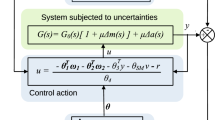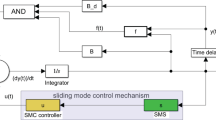Abstract
The global adaptive set stabilization problem of the attitude of a rigid spacecraft is addressed in this paper. Two different cases are considered. First, by using adaptive backstepping method, the authors design a global adaptive control law for the attitude control system with unknown inertia matrix such that the attitude and the angular velocities can be globally asymptotically stabilized to a set consisting of two equilibria. And then, based on the obtained backstepping adaptive law, the authors consider the case that the angular velocities are not measurable. By introducing an auxiliary state, a semi-global adaptive set stabilization law without angular velocity measurements is also designed. It is rigorously proved that, for the two cases, both of the closed loop systems satisfy the set stability. The effectiveness of the proposed methods is verified by simulation results.
Similar content being viewed by others
References
P. Tsiotras, Stabilization and optimality results for the attitude control problem, Journal of Guidance, Control, and Dynamics, 1996, 19(4): 772–779.
S. Di Gennaro, Adaptive robust stabilization of rigid spacecraft presence of disturbances, in Proceedings of the IEEE Conference on Decision and Control, 1995: 1147–1152.
S. J. Paynter and R. H. Bishop, Adaptive nonlinear attitude control and momentum management of spacecraft, Journal of Guidance, Control, and Dynamics, 1997, 20(5): 1025–1032.
B. Q. Wang, K. Gong, D. Yang, and J. F. Li, Fine attitude control by reaction wheels using variable-structure controller, Acta Astronautica, 2003, 52(8): 613–618.
D. Fragopoulos and M. Innocenti, Stability considerations in quaternion attitude control using discontinuous Lyapunov functions, IEE Proceeding, Control Theory and Applications, 2004, 151(3): 253–258.
S. M. Joshi, A. G. Kelkar, and J. T. Wen, Robust attitude stabilization of spacecraft using nonlinear quaternion feedback, IEEE Transactions on Automatic Control, 1995, 40(10): 1800–1803.
Y. Park, Robust and optimal attitude stabilization of spacecraft with external disturbances, Aerospace Science and Technology, 2005, 9(3): 253–259.
S. H. Ding and S. H. Li, Stabilization of the attitude of a rigid spacecraft with external disturbances using finite-time control techniques, Proceedings of the American Control Conference, 2007: 2459–2464.
S. H. Li, S. H., Ding, and Q. Li, Global set stabilisation of the spacecraft attitude using finite-time control technique, International Journal of Control, 2009, 82(5): 822–836.
R. B. Motlagh and M. R. J. Motlagh, Adaptive robust attitude tracking control of spacecraft, Proceedings of the IEEE Conference on Control Applications, 2005: 498–503.
S. Saicudean, A globally convergent angular velocity observer for rigid body motion, IEEE Transactions on Automatic Control, 1991, 36(12): 1493–1497.
F. Lizarralde and J. T. Wen, Attitude control without angular velocity measurement: A passivity approach, IEEE Transactions on Automatic Control, 1996, 4(3): 468–472.
P. Tsiotras, Further passivity results for the attitude control problem, IEEE Transactions on Automatic Control, 1998, 43(11): 1597–1600.
A. El-Gohary, Optimal control of a rigid spacecraft programmed motion without angular velocity measurements, European Journal of Mechanics A/Solids, 2006, 25(5): 854–866.
A. G. Kelkar, S. M. Joshi, and T. E. Alherts, Passivity-based control of nonlinear flexible multibody systems, IEEE Transactions on Automatic Control, 1995, 40(5): 910–914.
N. A. Chaturvedi and N. H. McClamroch, Almost global attitude stabilization of an orbiting satellite including gravity gradient and control saturation effects, Proceedings of the American Control Conference, 2006: 1748–1753.
S. P. Bhat and D. S. Bernstein, Topological obstruction to continuous global stabilization of rotational motion and the unwinding problem, Systems and Control Letters, 2000, 39(1): 63–70.
J. T. Wen and K. Kreutz-Delgado, The attitude control problem, IEEE Transactions on Automatic Control, 1991, 36(10): 1148–1163.
N. Rouche, P. Habets, and M. Laloy, Stability Theory by Liapunov’s Direct Method, Springer-Verlag, New York, 1977.
Y. Lin, E. D. Sontag, and Y. Wang, Recent results on Lyapunov-theoretic techniques for nonlinear stability, Proceedings of the American Control Conference, 1994: 1771–1775.
Y. Lin, E. D. Sontag, and Y. Wang, Various results concerning set input-to-state stability, Proceedings of IEEE Conference on Decision and Control, 1995: 1330–1335.
X. X. Liao, Mathematical Theory and Application of Stability, Publishing Company of Center China Normal University, Wuhan, 1988.
H. J. Sussmann and P. V. Kokotovic, The peaking phenomenon and the global stabilization of nonlinear systems, IEEE Transactions on Automatic Control, 1991, 36(4): 424–439.
T. R. Kane, P. W. Likins, and D. A. Levinson, Spacecraft Dynamics, McGraw-Hill, New York, 1983.
B. T. Costic, D. M. Dawson, M. S. De Queiroz, and V. Kapila, Quaternion-based adaptive attitude tracking controller without velocity measurements, Journal of Guidance, Control, and Dynamics, 2001, 24(6): 1214–1222.
Author information
Authors and Affiliations
Corresponding author
Additional information
This research is supported by the National Nature Science Foundation of China under Grant Nos. 60504007 and 61074013, Open Foundation of Key Laboratory of Micro-Inertial Instruments and Navigation Technology, Ministry of Education under Grant No. 201004, Initial Research Fund of Highly Specialized Personnel from Jiangsu University under Grant No. 10JDG112, and 973 Sub-project under Grant No. 2009CB724002.
This paper was recommended for publication by Editor Jifeng ZHANG.
Rights and permissions
About this article
Cite this article
Ding, S., Li, S. & Li, Q. Adaptive set stabilization of the attitude of a rigid spacecraft without angular velocity measurements. J Syst Sci Complex 24, 105–119 (2011). https://doi.org/10.1007/s11424-011-8214-1
Received:
Revised:
Published:
Issue Date:
DOI: https://doi.org/10.1007/s11424-011-8214-1




